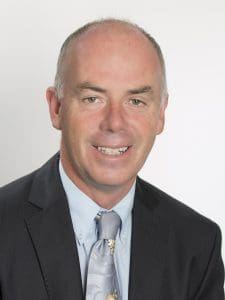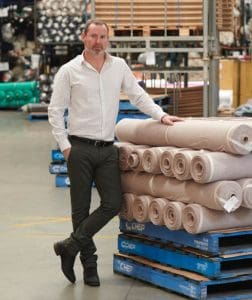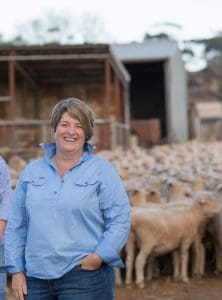
Incoming WoolProducers Australia president Steve Harrison has joined the SSC board.
AUSTRALIA’S Sheep Sustainability Framework board and the Sustainability Steering Group have welcomed new members and paid tribute to four outgoing contributors.
Incoming WoolProducers Australia president and Gippsland wool producer Steve Harrison, replaces former WPA president Ed Storey on the SSG board, and Melbourne-based manufacturer Julian Collins and South Australian producer Jane Kellock have joined the steering group.
SSG chair, Dr Scott Williams, said the new members will complement an outstanding group of leaders from across the value chain.
“With such a broad range of skills we can build and develop the SSF into a mature food and fibre framework that ensures sustainability from farm to fork and sheep to shelf,” Dr Williams said.
Mr Harrison said he has a clear goal to maintain trust in wool and to achieve this on an industry-wide basis, there must be collaboration. He started out with ten sheep and now runs 10,000 on his Gippsland farm.
“It’s difficult to achieve unity when we have such a vast range of environments and production systems for sheep and wool.
“But as an industry we’re very small – only point-six per cent of the apparel market – so we have to work together if we’re to achieve sustainability,” he said.
“I’m looking forward to positively contributing to industry decisions through the SSF and representing growers in key discussions with industry and other stakeholders on issues that directly affect our livelihoods, like animal welfare and biosecurity for disease prevention.”
Collins aims to inform retailer and consumers of industry work

ABMT global sales manager Julian Collins
Mr Collins is the global sales manager of ABMT, one of Australia’s largest textile mills that processes locally grown Merino wool and cotton into fabrics for brands like Kookai, Anaconda and Under Armour.
A media release said Mr Collins has maintained a keen interest in on-farm practices during his 15 years in the wool textile and apparel manufacturing industry. He’s looking forward to using his new role to better inform retailers and consumers about the work that sheep and wool producers and industry bodies are already doing, the statement said.
“Progress in areas such as the transition to renewable energies and improved welfare practices needs to be clearly communicated.
“At the other end, the SSF needs to collect clear and accurate data from producers that is highly relevant to retailers and consumers, so that we can communicate that the industry is in a great position,” Mr Collins said.
Kellock wants to ensure SSG framework is practical and viable

Jane Kellock
Ms Kellock is chair of South Australian Sheep and Beef Blueprints working group and would like to ensure the sheep sustainability framework is practical and viable for producers to achieve. She sees her new role as a valuable add-on to the work she’s already doing in industry bodies and at home.
Ms Kellock was born and raised on a sheep station in South Australia’s north.
“Personally, we’re working very hard on sustainability practices in our business.
“I think as industry bodies we need to be looking at things holistically, making sure that people and businesses are sustainable.
“The environmental side is important but so is the whole licence for us to farm including animal welfare, financial viability – everything,” she said.
“I’m looking forward to the SSF discussions and hearing different perspectives on what our value chain needs to achieve.”
Dr Williams expressed his gratitude and thanks on behalf of the SSF to those leaving the organisation, including Mr Storey, an original board member; NSW producer Ian McColl, who served two years on the board and one year on the SSG; and inaugural SSG members Ag Communicators SA managing director Deanna Lush and producer New South Wales producer Michael Field, who each served for three years.
Dr Williams said Mr Storey was a key contributor in developing the SSF and has been integral in making decisions on policy that will ensure that the sheep and wool industry stays strong for the long term.
Source – SSG.

HAVE YOUR SAY